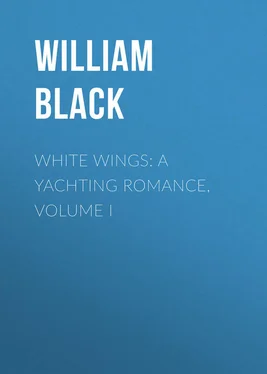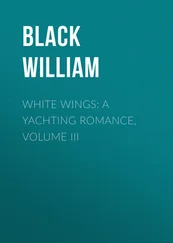William Black - White Wings - A Yachting Romance, Volume I
Здесь есть возможность читать онлайн «William Black - White Wings - A Yachting Romance, Volume I» — ознакомительный отрывок электронной книги совершенно бесплатно, а после прочтения отрывка купить полную версию. В некоторых случаях можно слушать аудио, скачать через торрент в формате fb2 и присутствует краткое содержание. Жанр: foreign_antique, foreign_prose, на английском языке. Описание произведения, (предисловие) а так же отзывы посетителей доступны на портале библиотеки ЛибКат.
- Название:White Wings: A Yachting Romance, Volume I
- Автор:
- Жанр:
- Год:неизвестен
- ISBN:нет данных
- Рейтинг книги:4 / 5. Голосов: 1
-
Избранное:Добавить в избранное
- Отзывы:
-
Ваша оценка:
- 80
- 1
- 2
- 3
- 4
- 5
White Wings: A Yachting Romance, Volume I: краткое содержание, описание и аннотация
Предлагаем к чтению аннотацию, описание, краткое содержание или предисловие (зависит от того, что написал сам автор книги «White Wings: A Yachting Romance, Volume I»). Если вы не нашли необходимую информацию о книге — напишите в комментариях, мы постараемся отыскать её.
White Wings: A Yachting Romance, Volume I — читать онлайн ознакомительный отрывок
Ниже представлен текст книги, разбитый по страницам. Система сохранения места последней прочитанной страницы, позволяет с удобством читать онлайн бесплатно книгу «White Wings: A Yachting Romance, Volume I», без необходимости каждый раз заново искать на чём Вы остановились. Поставьте закладку, и сможете в любой момент перейти на страницу, на которой закончили чтение.
Интервал:
Закладка:
So that was done, and we went on board again – one of us meanwhile vowing to himself that ere ever Mr. Frederick Smethurst set sail with us on board the White Dove , a rifle-bullet through her hull would send that gallant vessel to the lobsters.
Now what do you think our Mary Avon set to work to do – all during this beautiful summer evening, as we sat on deck and eyed curiously the other craft in the bay, or watched the firs grow dark against the silver-yellow twilight? We could not at first make out what she was driving at. Her occupation in the world, so far as she had any – beyond being the pleasantest of companions and the faithfullest of friends – was the painting of landscapes in oil, not the construction of Frankenstein monsters. But here she begins by declaring to us that there is one type of character that has never been described by any satirist, or dramatist, or fictionist – a common type, too, though only becoming pronounced in rare instances. It is the moral Tartuffe, she declares – the person who is through and through a hypocrite, not to cloak evil doings, but only that his eager love of approbation may be gratified. Look now how this creature of diseased vanity, of plausible manners, of pretentious humbug, rises out of the smoke like the figure summoned by a wizard's wand! As she gives us little touches here and there of the ways of this professor of bonhomie – this bundle of affectations – we begin to prefer the most diabolical villainy that any thousand of the really wicked Tartuffes could have committed. He grows and grows. His scraps of learning, as long as those more ignorant than himself are his audience; his mock humility anxious for praise; his parade of generous and sententious sentiment; his pretence – pretence – pretence – all arising from no evil machinations whatever, but from a morbid and restless craving for esteem. Hence, horrible shadow! Let us put out the candles and get to bed.
But next morning, as we find ourselves out on the blue Atlantic again, with Ru-na-Gaul lighthouse left far behind, and the pale line of Coll at the horizon, we begin to see why the skill and patient assiduity of this amateur psychologist should have raised that ghost for us the night before. Her uncle is coming. He is not one of the plausible kind. And if it should be necessary to invite him on board, might we not the more readily tolerate his cynical bluntness and rudeness, after we have been taught to abhor as the hatefullest of mortals the well-meaning hypocrite whose vanity makes his life a bundle of small lies? Very clever indeed, Miss Avon – very clever. But don't you raise any more ghosts; they are unpleasant company – even as an antidote. And now, John of Skye, if it must be that we are to encounter this pestilent creature at the end of our voyage, clap on all sail now, and take us right royally down through these far islands of the west. Ah! do we not know them of old? Soon as we get round the Cailleach Point we descry the nearest of them amid the loneliness of the wide Atlantic sea. For there is Carnaburg, with her spur of rock; and Fladda, long and rugged, and bare; and Lunga, with her peak; and the Dutchman's Cap – a pale blue in the south. How bravely the White Dove swings on her way – springing like a bird over the western swell! And as we get past Ru-Treshnish, behold! another group of islands – Gometra and the green-shored Ulva, that guard the entrance to Loch Tua; and Colonsay, the haunt of the sea birds; and the rock of Erisgeir – all shining in the sun. And then we hear a strange sound – different from the light rush of the waves – a low, and sullen, and distant booming, such as one faintly hears in a sea-shell. As the White Dove ploughs on her way, we come nearer and nearer to this wonder of the deep – the ribbed and fantastic shores of Staffa; and we see how the great Atlantic rollers, making for the cliffs of Gribun and Burg, are caught by those outer rocks and torn into masses of white foam, and sent roaring and thundering into the blackness of the caves. We pass close by; the air trembles with the shock of that mighty surge; there is a mist of spray rising into the summer air. And then we sail away again; and the day wears on as the white-winged White Dove bounds over the heavy seas; and Mary Avon – as we draw near the Ross of Mull, all glowing in the golden evening – is singing a song of Ulva.
But there is no time for romance, as the White Dove (drawing eight feet of water) makes in for the shallow harbour outside Bunessan.
"Down foresail!" calls out our John of Skye; and by and by her head comes up to the wind, the great mainsail flapping in the breeze. And again, "Down chub, boys!" and there is another rattle and roar amid the silence of this solitary little bay. The herons croak their fright and fly away on heavy wing; the curlews whistle shrilly; the sea-pyots whirr along the lonely shores. And then our good Friedrich d'or sounds his silver-toned bell.
The stillness of this summer evening on deck; the glory deepening over the wide Atlantic; the delightful laughter of the Laird over those "good ones" about Homesh; the sympathetic glance of Mary Avon's soft black eyes: did we not value them all the more that we knew we had something far different to look forward to? Even as we idled away the beautiful and lambent night, we had a vague consciousness that our enemy was stealthily drawing near. In a day or two at the most we should find the grim spectre of the East Wind in the rose-garden of Castle Osprey.
CHAPTER V
Bur when we went on deck the next morning we forgot all about the detestable person who was about to break in upon our peace (there was small chance that our faithful Angus Sutherland might encounter the snake in this summer paradise, and trample on him, and pitch him out; for this easy way of getting rid of disagreeable folk is not permitted in the Highlands nowadays) as we looked on the beautiful bay shining all around us.
"Dear me!" said Denny-mains, "if Tom Galbraith could only see that now! It is a great peety he has never been to this place. I'm thinking I must write to him."
The Laird did not remember that we had an artist on board – one who, if she was not so great an artist as Mr. Galbraith, had at least exhibited one or two small landscapes in oil at the Royal Academy. But then the Academicians, though they might dread the contrast between their own work and that of Tom Galbraith, could have no fear of Mary Avon.
And even Mr. Galbraith himself might have been puzzled to find among his pigments any equivalent for the rare and clear colours of this morning scene as now we sailed away from Bunessan with a light topsail breeze. How blue the day was – blue skies, blue seas, a faint transparent blue along the cliffs of Burg and Gribun, a darker blue where the far Ru-Treshanish ran out into the sea, a shadow of blue to mark where the caves of Staffa retreated from the surface of the sun-brown rocks! And here, nearer at hand, the warmer colours of the shore – the soft, velvety olive-greens of the moss and breckan; the splashes of lilac where the rocks were bare of herbage; the tender sunny reds where the granite promontories ran out to the sea; the beautiful cream-whites of the sandy bays!
Here, too, are the islands again as we get out into the open – Gometra, with its one white house at the point; and Inch Kenneth, where the seals show their shining black heads among the shallows; and Erisgeir and Colonsay, where the skarts alight to dry their wings on the rocks; and Staffa, and Lunga, and the Dutchman, lying peaceful enough now on the calm blue seas. We have time to look at them, for the wind is slight, and the broad-beamed White Dove is not a quick sailer in a light breeze. The best part of the forenoon is over before we find ourselves opposite to the gleaming white sands of the northern bays of Iona.
Читать дальшеИнтервал:
Закладка:
Похожие книги на «White Wings: A Yachting Romance, Volume I»
Представляем Вашему вниманию похожие книги на «White Wings: A Yachting Romance, Volume I» списком для выбора. Мы отобрали схожую по названию и смыслу литературу в надежде предоставить читателям больше вариантов отыскать новые, интересные, ещё непрочитанные произведения.
Обсуждение, отзывы о книге «White Wings: A Yachting Romance, Volume I» и просто собственные мнения читателей. Оставьте ваши комментарии, напишите, что Вы думаете о произведении, его смысле или главных героях. Укажите что конкретно понравилось, а что нет, и почему Вы так считаете.












